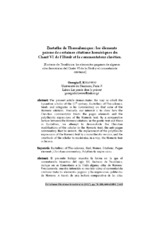Eustathe de Thessalonique: les élements païens de certaines citations homériques du Chant VI de l’Iliade et le commentateur chrétien
Eustacio de Tesalónica: los elementos paganos de algunas citas homéricas del Canto VI de la Iliada y el comentarista cristiano
Autor
Kolovou, Georgia E.
Editor
Universidad de Córdoba, UCOPressFecha
2017Materia
Eustathios of ThessalonicaIliad
Homer
Citations
Pagan elements
Christian commentary
Polytheistic expressions
Eustacio de Tesalónica
Ilíada
Homero
Citas
Clementos paganos
Comentario cristiano
Expresiones politeístas
METS:
Mostrar el registro METSPREMIS:
Mostrar el registro PREMISMetadatos
Mostrar el registro completo del ítemResumen
The present article demonstrates the way in which the byzantine scholar of the 12th century, Eustathios of Thessalonica, treats and integrates in his Commentary on Iliad some of the Homeric citations. Precisely, our interest is to show how the Christian commentator treats the pagan elements and the polytheistic expressions of the Homeric text. By a comparative lecture between the Homeric citations in the poetic text and those in Eustathios, we attempt to demonstrate the Christian modifications of the scholar in the Homeric text, the anti-pagan commentary that he invents, the replacement of the polytheistic expressions of the Homeric text by a monotheistic version, and the «method» of the scholar to modernize, in a way, the Homeric text in his era. El presente trabajo muestra la forma en la que el comentarista bizantino del siglo XII, Eustacio de Tesalónica, incluye en su Comentario a la Ilíada algunas citas de Homero. Precisamente, nuestra intención es mostrar cómo el comentarista cristiano trata los elementos paganos y las expresiones politeístas de Homero. A través de una lectura comparativa de las citas homéricas en el texto poético de la obra de Eustacio, pretendemos demostrar las modificaciones cristianas hechas por Eustacio en Homero, el comentario anti-pagano que inventa, el reemplazo de las expresiones politeístas del texto de Homero por una versión monoteísta y el “método” de Eustacio para modernizar el texto homérico en su época.

